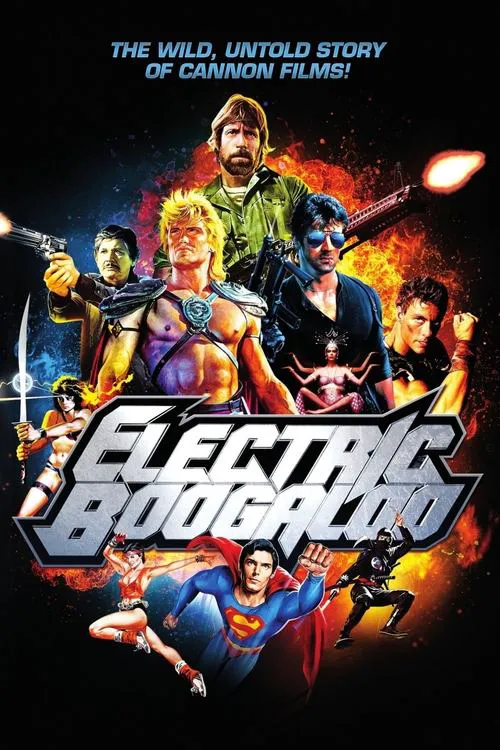Electric Boogaloo: The Wild, Untold Story of Cannon Films

Plot
In the 1970s and 1980s, Hollywood was dominated by the Big Six studios - Warner Bros., Universal, Paramount, Columbia, 20th Century Fox, and Disney. However, amidst the giant studios, there was a rebellious upstart, a small independent production company that sought to shake the foundations of the film industry. The Cannon Film Group, founded by the enterprising Israeli cousins Menahem Golan and Yoram Globus, was a force to be reckoned with, taking on the giants and consistently producing high-octane action films that captivated audiences worldwide. The story of Cannon Films is a fascinating tale of two young men who dared to challenge the conventions of the film industry. Born to Orthodox Jewish families in Jerusalem, Menahem and Yoram Golan developed a love for cinema at an early age. They began making amateur films together, eventually saving up enough money to open a small film production company in Israel. Their early successes caught the attention of international film distributors, leading them to expand their operations to Europe. In 1979, the Golan brothers established Cannon Films USA, with an initial investment of $1 million. They set up shop in Los Angeles, surrounded by the giants of the film industry, but undeterred by their more established competition. With an emphasis on low-budget productions, high-octane action, and exploitation cinema, Cannon quickly became known for churning out a steady stream of B-movies that appealed to a mass audience. The breakthrough for Cannon came with the release of "Breakin'" (1984), a dance film that became a surprise hit. This film marked a turning point for the company, as they began to attract attention from the major studios and talent scouts. Golan and Globus leveraged this newfound exposure to secure deals with bigger stars and more substantial budgets, expanding their reach and influence in Hollywood. Cannon was about to become a household name, thanks in large part to a string of successes that included the likes of "The Delta Force" (1986), "Bloodsport" (1988), "Over the Top" (1987), and "Invisible Kid" (1986). These films, featuring a mix of martial arts, action, and science fiction, cemented the company's status as a go-to producer of high-concept, low-budget cinema. The brand was synonymous with explosive, adrenaline-fueled entertainment, drawing millions of fans worldwide. One of Cannon's most significant partnerships was with the legendary martial artist and actor Jean-Claude Van Damme. In the late 1980s, Van Damme collaborated with Cannon on several films, including "Bloodsport" and "Kickboxer" (1989). These movies showcased the actor's unique blend of fighting prowess and charisma on screen, catapulting him to international stardom. Van Damme's association with Cannon marked a critical juncture in his career, cementing his position as one of the most prominent action stars of the 1980s. However, the glory days of Cannon Films were not without controversy. The company's fast-paced production schedule, often resulting in rushed releases, and the tendency to favor action over artistic merit led to criticism from some film critics. Additionally, Golan and Globus were known for pushing the envelope with their more racy and provocative films, sparking debates about censorship and taste. Despite the challenges, Cannon continued to thrive. The company's innovative marketing strategies and keen sense of audience appetite enabled them to consistently produce successful films that captured the zeitgeist of the era. By embracing the edgier side of cinema, Cannon carved out a niche for itself that was both distinctive and commercially viable. However, the golden era of Cannon Films did not last forever. In 1988, the company began to feel the strain of increased competition from the rise of independent film production and the growing sophistication of action cinema. Additionally, internal power struggles between Golan and Globus took a toll on the company's management and morale. By the early 1990s, Cannon was facing significant financial difficulties and began to scale back its operations. The once-mighty Cannon Films eventually closed its doors in 1993, marking the end of an era in Hollywood. Despite their tumultuous history, the legacy of Menahem and Yoram Golan lives on, inspiring future generations of film producers and entrepreneurs. Their groundbreaking approach to low-budget, action-driven cinema forever changed the landscape of Hollywood, paving the way for new voices and visions to emerge. In the end, Cannon Films was not just a small independent production company; it was a revolutionary force that shook the very foundations of the film industry. Its impact is still felt today, in the countless action films and thrillers that have followed in its footsteps, drawing inspiration from the pioneering spirit and bold vision of Menahem and Yoram Golan.
Reviews
Recommendations




